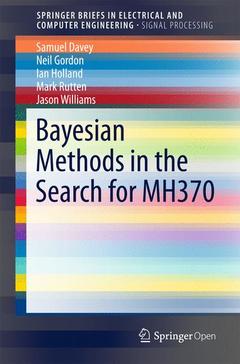Bayesian Methods in the Search for MH370, 1st ed. 2016 SpringerBriefs in Signal Processing Series
Auteurs : Gordon Neil, Davey Sam, Holland Ian, Rutten Mark, Williams Jason

This book demonstrates how nonlinear/non-Gaussian Bayesian time series estimation methods were used to produce a probability distribution of potential MH370 flight paths. It provides details of how the probabilistic models of aircraft flight dynamics, satellite communication system measurements, environmental effects and radar data were constructed and calibrated. The probability distribution was used to define the search zone in the southern Indian Ocean.
The book describes particle-filter based numerical calculation of the aircraft flight-path probability distribution and validates the method using data from several of the involved aircraft?s previous flights. Finally it is shown how the Reunion Island flaperon debris find affects the search probability distribution.
Introduction.- Factual Description of Accident and Available Information.- Bayesian Approach.- Inmarsat Satellite Communication System.- Aircraft Cruise Dynamics.- Aircraft Maneuver Dynamics.- Particle Filter Implementations.- Validation Experiments.- Application to MH370 Accident.- Incorporating Search Data.- Conclusions.
Date de parution : 07-2016
Ouvrage de 114 p.
15.5x23.5 cm
Thèmes de Bayesian Methods in the Search for MH370 :
Ces ouvrages sont susceptibles de vous intéresser

Handbook of Probabilistic Models 187,99 €


